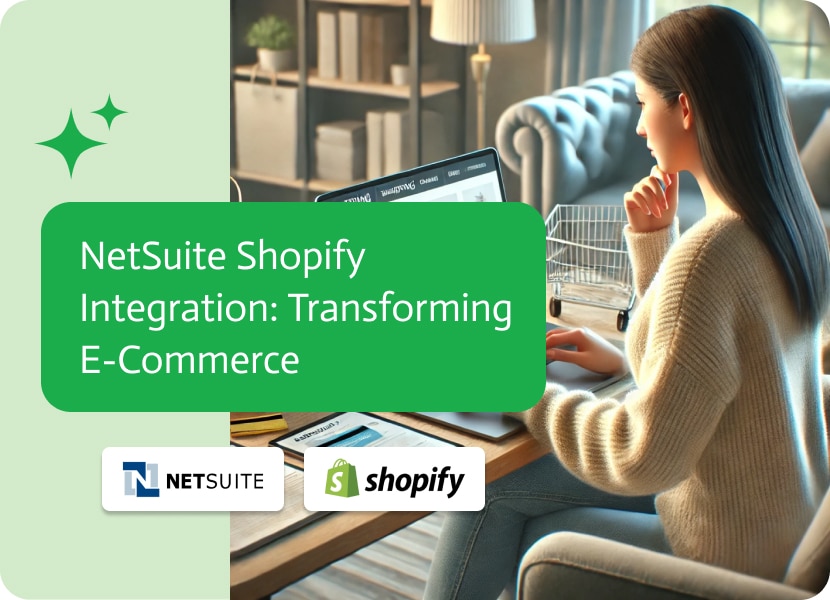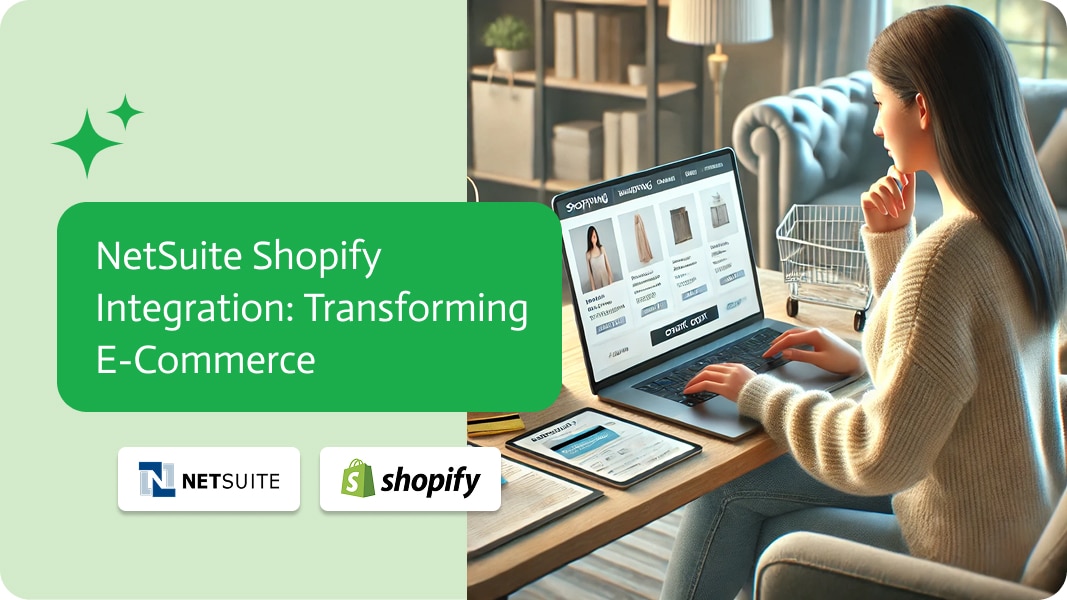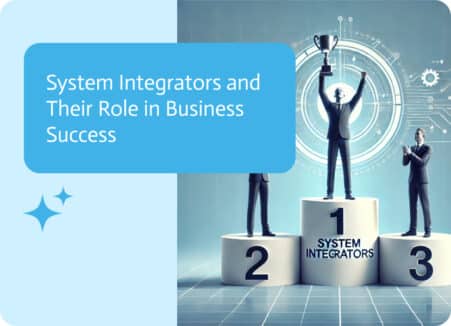

NetSuite Shopify Integration: Transforming E-Commerce
Introduction
In today’s fast-paced e-commerce landscape, seamless integration between key business systems is no longer a luxury but a necessity. The NetSuite Shopify Integration offers a game-changing solution, connecting the robust enterprise resource planning (ERP) capabilities of NetSuite with Shopify’s versatile e-commerce platform. This integration is not just about syncing data; it’s about creating a unified ecosystem that enhances operational efficiency, customer satisfaction, and business agility.
The Benefits of NetSuite Shopify Integration
Streamlined Operations
Integrating Shopify with NetSuite centralizes data management, eliminating data silos and enabling real-time access to critical business information. This centralization streamlines operations, improves decision-making, and enhances overall business efficiency.
Improved Customer Experience
With synchronized data, businesses can provide customers with accurate product availability, order status updates, and faster delivery. This enhanced customer experience fosters loyalty and encourages repeat purchases.
Enhanced Inventory Management
The integration offers real-time inventory visibility, helping businesses avoid stockouts and overstock situations. This capability is particularly beneficial for e-commerce businesses managing multiple warehouses or operating in multiple regions.
Automated Order Fulfillment
Automation of order processing reduces manual errors, speeds up order handling, and ensures timely delivery. This efficiency not only saves time but also enhances customer satisfaction by providing accurate order tracking and faster shipping.
Financial Accuracy and Compliance
Real-time data synchronization ensures that financial records are always up-to-date, aiding in accurate accounting and compliance with financial regulations. This transparency is essential for strategic decision-making and maintaining financial health.
Scalability for Growth
The integration supports business growth by easily scaling operations to accommodate increased order volumes, new sales channels, or expanded product lines. This flexibility allows businesses to adapt quickly to market demands.
Unique Use Cases of NetSuite Shopify Integration
A Fashion Retailer’s Journey to Operational Excellence
A rapidly growing fashion retailer faced challenges with inventory discrepancies, delayed order processing, and inefficient financial reporting. By integrating Shopify with NetSuite through an iPaaS solution, they achieved:
- Real-Time Inventory Tracking: Reduced stockouts and improved inventory turnover.
- Faster Order Processing: Automated workflows decreased order processing time by 30%.
- Enhanced Financial Reporting: Real-time financial data improved decision-making and compliance.
This integration allowed the retailer to focus on expanding their product lines and entering new markets, knowing their backend operations were seamlessly managed.
Scaling a Direct-to-Consumer Brand
A direct-to-consumer (DTC) brand aiming to expand into international markets leveraged the NetSuite Shopify Integration to streamline its operations:
- Multi-Currency Support: Automated currency conversions for international transactions.
- Localized Inventory Management: Managed inventory across multiple countries from a single dashboard.
- Improved Customer Service: Provided localized customer support with real-time order tracking.
The integration enabled the brand to scale efficiently, handling a surge in international orders without compromising service quality or operational efficiency.
Crafting a Personalized Customer Experience for a Home Décor Business
A home décor e-commerce business sought to enhance its customer experience by integrating Shopify with NetSuite. This integration led to:
- Tailored Marketing Campaigns: By analyzing customer purchase history and preferences, they created personalized marketing campaigns that boosted customer engagement.
- Dynamic Inventory Adjustments: Real-time data allowed them to quickly adapt inventory levels based on customer trends and seasonality.
- Seamless Return Process: Automated workflows simplified the return process, improving customer satisfaction and loyalty.
This strategic integration positioned the business as a customer-centric brand, driving long-term loyalty and higher average order values.
A Niche Food & Beverage Brand’s Efficiency Leap
A niche food and beverage brand struggling with manual order management and inventory tracking successfully integrated Shopify and NetSuite. Key outcomes included:
- Automated Compliance Reporting: Simplified compliance with food safety regulations through automated reporting.
- Real-Time Inventory Management: Minimized waste by tracking perishable inventory in real-time.
- Enhanced Order Accuracy: Automation reduced manual errors, ensuring accurate order fulfillment.
The integration allowed the brand to focus on product innovation and market expansion, knowing their operations were under control.
Overcoming Integration Challenges
While the benefits are substantial, integrating NetSuite with Shopify can present challenges such as data mapping complexities, user adoption issues, and technical hurdles. These challenges can be mitigated by:
- Thorough Planning: Define clear objectives and integration requirements.
- User Training: Invest in comprehensive training programs to ensure smooth user adoption.
- Continuous Monitoring: Regularly monitor integration performance and address any issues promptly.
Why Choose Integration via iPaaS?
Before diving into the specifics of the NetSuite Shopify Integration, it’s crucial to understand why many companies opt for an Integration Platform as a Service (iPaaS) over native integrations. iPaaS solutions, like Noca AI, provide a scalable, flexible, and user-friendly approach to integration. Unlike native integrations, which are often limited in scope and adaptability, iPaaS offers:
- Comprehensive Connectivity: Connect a variety of applications and systems beyond just NetSuite and Shopify.
- Ease of Use: Drag-and-drop interfaces and pre-built connectors make it accessible even for non-technical users.
- Scalability: Easily scale integrations as your business grows without the need for extensive rework.
- Real-Time Data Sync: Ensure data consistency and accuracy across platforms in real-time.
- Cost-Effectiveness: Reduce the need for custom development and ongoing maintenance.
Conclusion
The NetSuite Shopify Integration is a transformative solution for e-commerce businesses aiming to streamline operations, enhance customer satisfaction, and drive growth. By centralizing critical functions like inventory management, order processing, and financial reporting, this integration enables businesses to operate more efficiently and make informed, data-driven decisions. Leveraging an iPaaS solution like Noca AI further enhances these benefits by offering scalability, real-time data synchronization, and ease of use, making it an ideal choice for companies looking to stay competitive in the fast-evolving digital marketplace.
Whether you’re a growing retailer looking to expand into new markets or an established brand seeking to optimize your operations, integrating NetSuite and Shopify can provide the agility and efficiency needed to thrive. Embrace the power of integration to unlock new levels of operational excellence and customer engagement.
Q&A: Common Questions About NetSuite Shopify Integration
1. What are the primary advantages of using an iPaaS solution for this integration?
iPaaS solutions like Noca AI offer comprehensive connectivity, ease of use, scalability, and real-time data synchronization, making them a superior choice for integrating NetSuite and Shopify.
2. How does the integration improve inventory management?
The integration provides real-time inventory visibility, helping businesses optimize stock levels, prevent stockouts, and reduce carrying costs.
3. Can this integration handle multi-currency and multi-language requirements?
Yes, the integration can support multi-currency transactions and multi-language capabilities, making it ideal for businesses operating in international markets.
4. What are the typical challenges businesses face during the integration process?
Common challenges include data mapping complexities, user adoption issues, and technical hurdles such as API limitations and system compatibility.
5. How does the integration enhance customer service?
By providing real-time order tracking, accurate inventory data, and faster order processing, the integration significantly improves the overall customer experience, leading to higher satisfaction and loyalty.


